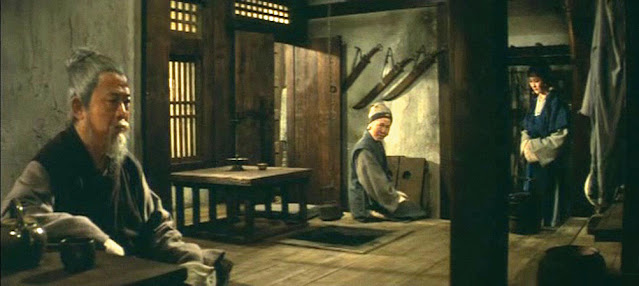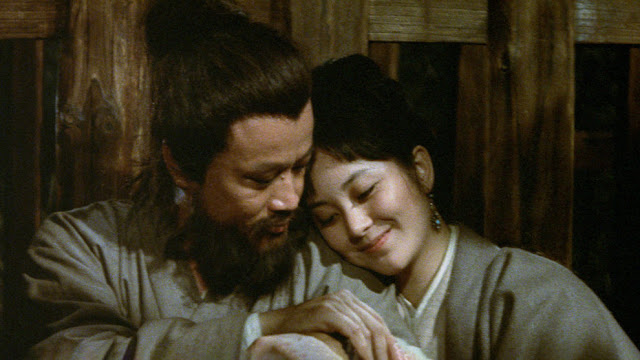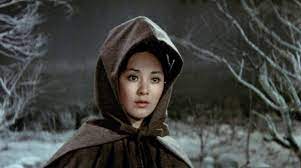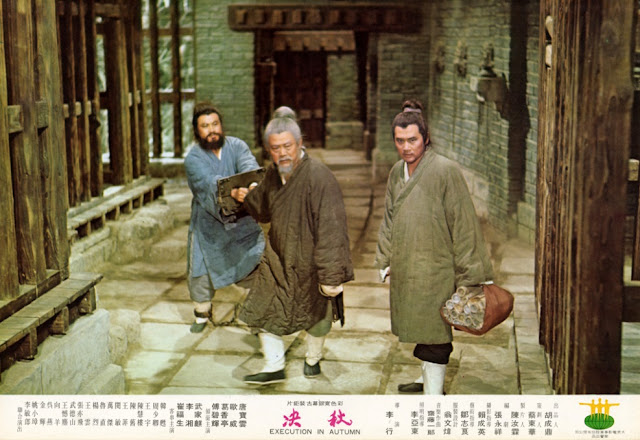Execution in Autumn
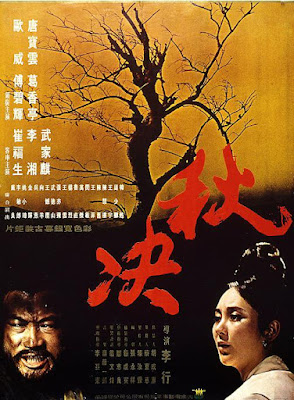
Director: Lee Hsing
Year: 1972
Rating: 7.5
Even after years of watching
Asian films and in particular hundreds of Hong Kong films as well as being
one of the founders of the New York Asian Film Festival (plug!), I am starting
to realize what a black hole my knowledge is of older Taiwanese films. I
am familiar with parts of it - the low budget kung fu films that were a weak
imitation of Hong Kong martial arts films; the weepie melodramas that made
Brigitte Lin and Joan Lin stars at home; the films that were termed Black
Movies which took violence and sex to another level and then of course there
were the King Hu films that almost feel like a specific genre they are so
exquisite. But that just touches what a strong film Industry Taiwan had
from the 1960s - 1980s. But the problem is that so few of these films have
been restored and are available. The kung-fu videos tend to be in shoddy
condition often only dubbed in English, the Weepies are mainly available
in the vcd format, again often with no subs, the Black Movies were nearly
all lost. Only King Hu because of his stature has had his films brought out
in pristine condition. Where are all the others? Hundreds of films were made
during this period. Are they all lost as well? Is anyone making an attempt
to recover these films?
This came to mind with this film that is directed by Lee Hsing. Lee Hsing
was called the Godfather of Taiwanese films. I had never heard of him till
I recently saw Wheel of Life in which one of the three segments was his.
His films were all produced in Taiwan and if you look at the filmographies
of the actors in this film, there are very few films that I have heard of.
One of the veteran actors has 250 credits - almost all Taiwanese. Films with
titles like Blood Splashing Over Rainbow Bridge, Heroine in the Dust and
Secret Agent 001. They may be terrible but I would love the chance to see
them. My guess is I never will but wouldn't it be cool.
Execution in Autumn is one of the few Taiwanese films that has been restored
and is making the rounds of a few festivals. It was Taiwan's submission
to the Academy Awards in 1972 and it won the Best Film, Director and Actor
awards at the Golden Horse. This is a serious film that explores such themes
as redemption, Confucius thought, Christ imagery, accepting death, filial
duty, family lineage and patriarchy and finally renewal. It manages to do
so in a basic structure of only a few sets, a handful of actors and a simple
plot. Pei Gang (Ou Wei - who passed away at 37 with 96 film credits) is the
only son of the wealthy Pei family. He has been brought up by his grandmother
(Fuh Bih-huei - 116 credits) to be the heir to the family but along the way
she has spoiled him terribly and used money to get him out of trouble. But
when he brutally kills three people and is sentenced to death his grandmother
can do little to save him.
He is a savage spoiled man, angry at the world, unable to accept responsibility
for his actions or his execution. But there is a wrinkle in this. During
the Han dynasty executions can only be carried out in autumn and it is winter.
Pei Gang has a year to wait while his grandmother tries to use bribes or
influence to free him. The thought of death terrifies him and he screams
out against it - one of his fellow prisoners (there are only three - one
a thief interestingly) tells him from the day we are born we are sentenced
to death but what is important is dying in peace and honor. But it
all falls through and his grandmother feels she has only one last option
to keep the family name going after his death. So she persuades Lien Er (Tang
Pao-yun) her daughter by adoption to bear Pei Gung's child. Slowly, reluctantly
with his growing feelings for Lien Er and discussions with his warden (Ko
Hsiang-ting - 259 credits), Pei begins to re-evaluate his life and accept
death as simply part of the wheel of life. It is an interesting film - slow,
thoughtful with an ending that is surprisingly emotionally powerful.


